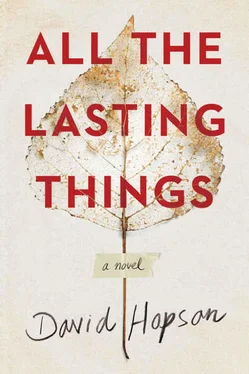“I don’t know where to start.”
“I can help you go through it.”
But even as Claudia clicked dutifully on Alex Ross’ New Yorker profile, her mind continued to feel its way down darkened but thrilling alleys she’d made herself avoid for the last twenty years. Somewhere, somewhere in the murk of the past, lay the body of the man she’d left broken by her attempt to spare him pain. The year she delivered the baby had been spent in the anonymous thrall of New York City. She hid from her parents, who feared that she, like her brother, had developed a drug problem; she hid from Nick, who returned from Stanford to track her down only to find that she’d changed addresses and effectively disappeared.
“You just gave him away.” Nick wept the night he finally found her, when she finally explained, three months after she’d placed the baby into strangers’ arms. “I didn’t deserve a say in that?”
“You would have wanted to get married. Which means I would have left school and probably you would too.”
“We can still get married. We can get the baby back.”
“No, we can’t. I don’t want to get married, Nick.” She reached out to him and took his hand. “Say we did. Say we got married and had the baby and the three of us moved back to Alluvia tomorrow. How long do you think it would take before I hated you for that? How long before I hated the baby?”
“You’ve got it all figured out. You have that little faith?”
“In us? I did this for us.”
“There is no us!”
At the end of that conversation, he hadn’t slammed the door between them, but shut it with such quiet resolve she felt sure it would never open again. Nick denied her the opportunity for penitence, which she knew she didn’t deserve. He vowed to fight her, to fight for custody of their son, but in the end, he didn’t. He disappeared as decisively as she had. And that, it seemed, was that.
Two decades later, Claudia could still be shaken awake by the sickening feeling that she’d not only turned over her only child but also returned an entire life like a piece of misaddressed mail. She’d set Max and Nick out to sea in separate little boats, but who was to say that if they’d stayed together things would have ended up the way she thought? Maybe she and Nick wouldn’t have quit school or retreated to the soggy solace of their childhood homes. She had no way to tell. All she could say with certainty was that she’d always regretted one decision more than the other: she wanted Nick’s forgiveness most of all.
But what about Max’s forgiveness? Was it not another failure not to ask for that too? On one hand, she’d failed to walk into that abortion clinic and end his troubles before they started. On the other, she’d failed to offer him a mother’s love — even a mother who assumed she had little love to give — and placed him instead in the care of a beleaguered social worker whose guarantee that everything would be as it should be sounded hollow as a drum. She failed to seek out her son. Failed to let him know that even though she seemed like a woman forever moving forward, she sometimes, with doubt and sadness, looked back. Even now that Max had found her, she’d failed to return the balls of easy banter he had rolled so generously to her feet during their quick phone call. Did she like living in New York? How long had she been an architect? If she couldn’t answer this first round of questions, how could she possibly field the next?
She stared at the Leibovitz photo—“Look,” Oliver said with wonder, “I never noticed before how much he looks like you”—and started reading the Ross article from the top: In 2002, at the age of twelve, the son of a violin teacher and a novice inventor from a small city in upstate New York convinced a packed house at Carnegie Hall that they’d just witnessed the second coming of Pablo Casals .
By six forty-five the next morning, just as the tenebrous sky began brightening toward dawn, she sped past the old weatherworn sign that stood at the side of the road: “Welcome to Alluvia.” She slowed the car to a crawl as she passed the tennis courts, slowed even more as the post office and pizza parlor and library receded one after the other in the rearview mirror. A fist battered inside of her, the knocking so furious that by the time she turned onto School Street, she actually thought she was coming apart. Her breath shuddered. Her hands shook. She gripped the wheel in a stranglehold and rolled to a stop at the corner of Palmer and School.
Expecting, hoping, to find her parents’ house as still and dark as the rest of the street, she stared at the boy on the top step of the porch with terror, awe, and a childish attachment to her own pain. He was real. He was real. But why was he here? Why was he doing this to her ?
From the distant corner where she sat, she couldn’t make out the face that mirrored her own. She saw only a boy in an oversized black hoodie, head bent, worrying scabs of paint from her parents’ porch stairs. In this casual, slightly monastic pose of self-absorption, he was identical to countless boys she saw camped on the college greens. A standard-issue teenager.
No, she couldn’t do it.
When she took her foot off the brake, she had no solidly formed idea of where she was going. She simply wanted to get away. Bypassing the house, she continued along the sleeping, leaf-strewn curve of School Street until she came to the Anselmans’, a once picture-perfect but now woefully shabby Queen Anne that had belonged to the ancient organist at the Presbyterian church and his spinster sister. Claudia stopped. The cracked paint job and crooked basketball hoop that hung over the garage door made clear that the new owners were younger and less fastidious than their predecessors, but as a child, this had been Claudia’s favorite house in all of Alluvia. Its fairy tale tower, pastel fancy butt shingles, and gingerbread detailing had fed a little girl’s fantasy of trapped princesses and the deceptively pretty homes of the witches who preyed upon them.
She remembered sitting on the verdant strip of the Anselmans’ lawn, sixteen years old, sunning herself like Sue Lyon with her skimpy bikini top and cat eye sunglasses, as Nick painted the flourishing scrollwork of the gables. His father had left him to finish the job with a winking admonishment that Nick didn’t appreciate.
“I wasn’t making moon eyes at you,” Nick called sullenly from his ladder perch. “Does anyone under fifty even know what that means?”
“Come on, Moonbeam,” Claudia called back. “The faster you finish, the faster we can leave.”
Nick unhooked his bucket and began climbing down. “Screw it,” he said once his feet hit the ground. “I’m finished.” His rebelliousness was both more decisive and more vulgar now that his father wasn’t there to witness it, but Claudia didn’t mind. She liked the rare occasion when the scorpion that slept inside this mild-mannered boy scuttled out into the open with its tail raised. She egged him on, lifting her glasses to stare up at his handiwork, and said, “You missed a spot.”
He laughed a temperate laugh as he set the paint bucket at his feet, then, taking the brush in hand, leapt at her like a madman with a knife.
“Truce!” Claudia screamed, jumping to her feet.
“Oh. Now she wants a truce.” He grinned, forcing her retreat with every jab.
“Look what you’re doing to the grass,” she said with real alarm in her voice. She pointed to the Pollocky dribs of pink paint, running thick to thin, that threaded the green. “Nice job.”
Chastened, Nick held his palm under the dripping bristles and returned the brush to the bucket. He wiped his hand on his already motley jeans and dragged his foot across the vandalized lawn. Frowning at his sneaker, the lousy eraser, he said, “You think he’s a pill about his lawn. You should see his house.”
Читать дальше












